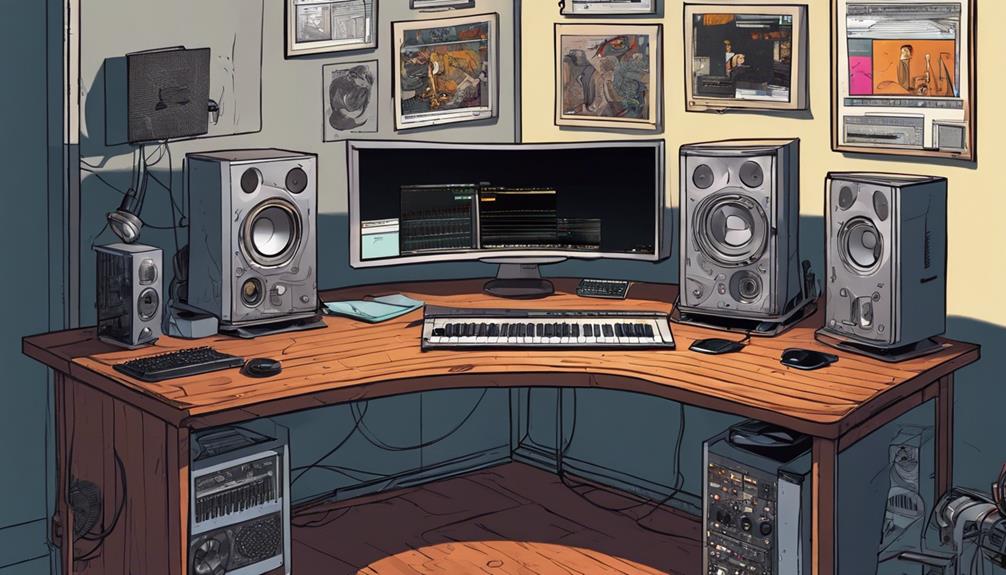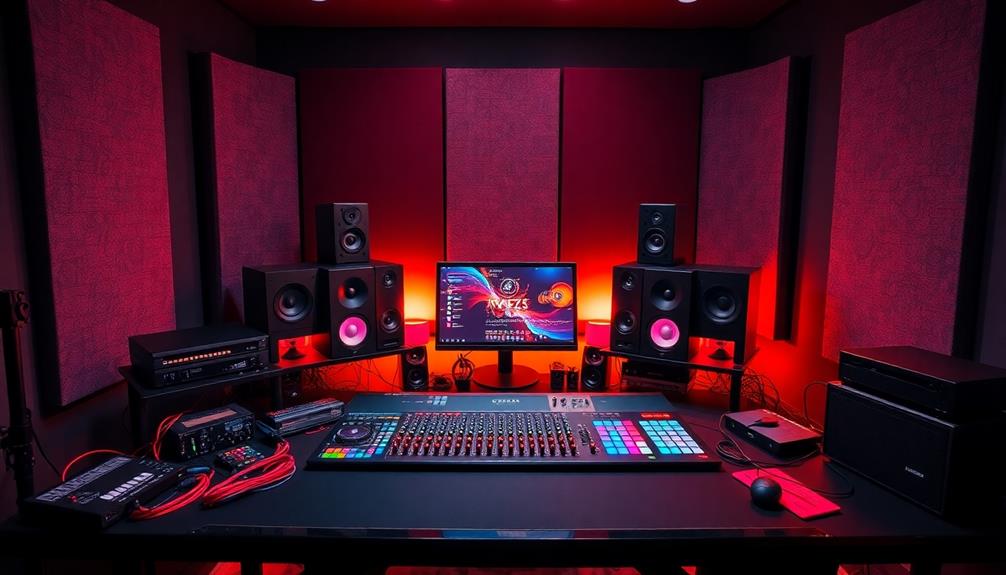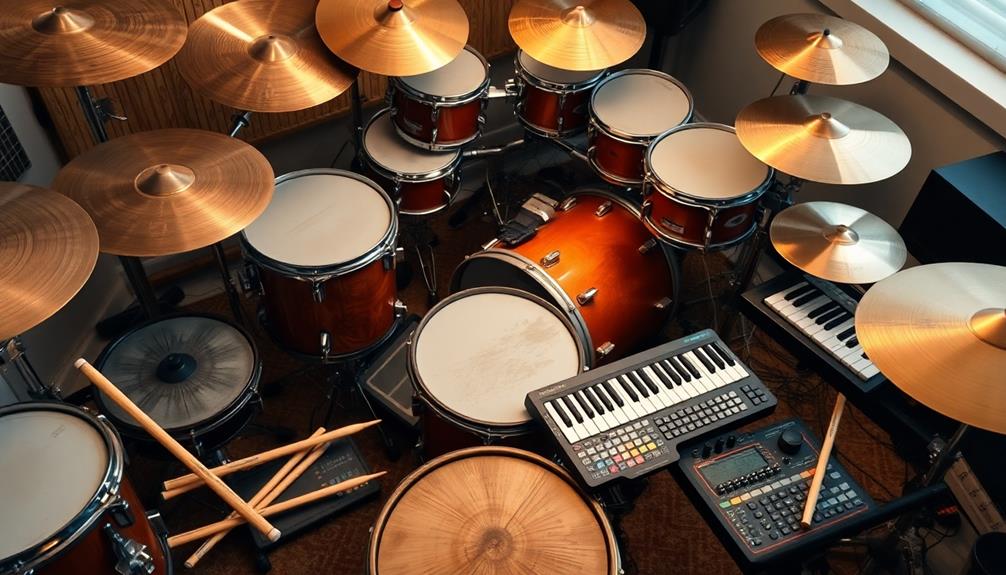When it comes to music production, having a solid foundation in music theory and reading music is essential. I've found that books like 'Music Theory for the Bass Player' and 'How to Read Music in 30 Days' provide thorough guides to music theory. For beginners, 'Music Production for Beginners Guide' and 'Piano Book for Adult Beginners' offer step-by-step instructions. If you're looking for a more detailed approach, 'How to Read Music for Dummies' and 'The Basic Guide to How To Read Music' are great resources. By exploring these books, I've gained a deeper understanding of music production and theory. Now, let's dive deeper into the world of music production and uncover more expert insights.
Key Takeaways
- For music production, start with comprehensive music theory guides like "Music Theory Guide to Understanding and Learning" to build a strong foundation.
- "Music Production for Beginners Guide" provides a thorough overview of the music production process, including mixing and mastering.
- "Music Habits: The Mental Game of Electronic Music Production" focuses on the mental aspect of music production, offering practical advice on forming good habits.
- "Music Theory for the Bass Player: An In-Depth Guide" integrates music theory with technique and genres, suitable for musicians of all levels.
- "How to Read Music in 30 Days" is a comprehensive guide with a step-by-step program, ideal for complete beginners in music theory.
Music Theory for the Bass Player

When it comes to sharpening my bass skills, I've found that Music Theory for the Bass Player: An In-depth Guide is the best choice for musicians like me who want to dive deep into the fundamentals of music theory and take their playing to the next level.
This extensive workbook, accompanied by 89 online videos, focuses on the essential elements of music theory, including intervals, scales, chords, and harmony. The book's structured approach, complete with fretboard diagrams, musical examples, and exercises, has helped me improve my understanding of major and minor chords, and I appreciate how it emphasizes relaxed posture and optimized fingering for good tone.
What I like most about this book is its accessibility – it's suitable for beginners and seasoned players alike. The quizzes and exercises really enhance the learning process, and I've had positive experiences with the book and online course. Plus, it's recommended by musicians and music producers, which speaks to its effectiveness.
With Music Theory for the Bass Player, I've been able to integrate music theory, technique, and different genres into my practice, and I've seen significant improvement in my playing.
Best For: Musicians of all levels, from beginners to seasoned players, who want to improve their understanding of music theory and take their bass playing to the next level.
Pros:
- Comprehensive and structured approach to learning music theory, including intervals, scales, chords, and harmony
- Suitable for musicians of all levels, with accessible language and exercises that enhance the learning process
- Emphasis on relaxed posture and optimized fingering for good tone, leading to improved playing technique
Cons:
- None mentioned in the provided facts and testimonials.
Music Production for Beginners Guide

If you're new to music production and want an all-encompassing guide to get you started, the 'Music Production For Beginners | 2025+ Edition' is an ideal choice. This book provides a thorough overview of the music production process, covering topics such as industry jargon, music theory, and the use of AI-generated music.
I found the step-by-step mixing and mastering guide particularly helpful, as it guided me through the process with ease. The book also offers valuable insights into common beginner mistakes, hit songwriting formulas, and tips on getting your music signed and making money.
While some critics argue that the content is in-depth and repetitive, I found the level of detail provided to be adequate for a beginner like myself. Overall, this book is a great resource for anyone looking to explore music production from the comfort of their own home.
Best For: Those who are new to music production and want a comprehensive guide to get started from the comfort of their own home.
Pros:
- Provides a thorough overview of the music production process, covering topics such as industry jargon, music theory, and the use of AI-generated music.
- Offers valuable insights into common beginner mistakes, hit songwriting formulas, and tips on getting your music signed and making money.
- Includes a step-by-step mixing and mastering guide that is easy to follow.
Cons:
- Some critics argue that the content is surface-level and repetitive.
- Limited depth and lack of specific product references.
- Criticism of vague and generic treatment of topics.
How to Read Music in 30 Days: Music Theory for Beginners

For beginners seeking to swiftly grasp music theory fundamentals, 'How to Read Music in 30 Days: Music Theory for Beginners' stands out as a top choice, offering a thorough 30-day program to rapidly develop essential skills.
This extensive guide is divided into three main sections: rhythm, pitch, and expression, providing a logical progression of concepts that's easy to follow. With over 150 music examples, 100 written exercises, and 10 listening experiences, I appreciate how the author provides a step-by-step approach to learning music theory.
The inclusion of audio examples, downloadable from the book, helps to reinforce understanding, and I find the score reading challenges and expert tips particularly useful.
Best For: Beginners seeking to quickly learn music theory fundamentals and improve their music reading skills.
Pros:
- Provides a logical and comprehensive 30-day program to learn music theory basics
- Includes a wide range of learning resources, such as audio examples, written exercises, and listening experiences
- Offers a supportive online community and responsive author interaction to help with any questions or challenges
Cons:
- May require dedication and consistent effort to complete the 30-day program
- Some users may find the amount of information overwhelming, especially if they are complete beginners
- The book's focus on music theory fundamentals may not provide advanced or specialized knowledge for more experienced musicians
Piano Book for Adult Beginners

As an adult looking to reignite your passion for piano playing, the Piano Book for Adult Beginners stands out as an ideal choice, offering a thorough guide to learning famous piano songs, reading music, and understanding essential theory and technique. This extensive book takes a progressive approach to skill-building, making it suitable for beginners.
I appreciate the inclusion of easy-to-understand instructions, streaming video lessons, and 75 MP3 audio files that help me hear how the songs sound. The book covers a range of famous piano pieces, including Beethoven's 'Für Elise' and Scott Joplin's 'The Entertainer'.
Users have praised the book for its adult-friendly approach, effectiveness in teaching keyboard scales, chords, sharps, and flats, and helpfulness in reviewing piano basics. To get the most out of this book, consistent practice is key.
With its interactive and engaging lessons, I'm confident that I can improve my piano skills and expand my repertoire of beloved piano songs.
Best For: Adult beginners who want to learn famous piano songs, read music, and understand theory and technique.
Pros:
- Adult-friendly approach to learning piano, making it suitable for beginners
- Inclusive of easy-to-understand instructions, streaming video lessons, and MP3 audio files to aid learning
- Covers a range of famous piano pieces, helping to expand the learner's repertoire
Cons:
- Requires consistent practice to master the content
- May need additional resources, such as YouTube links, to practice songs effectively
- No specific mention of catering to learners with prior piano experience or more advanced skills.
How to Read Music for Dummies

When it comes to building a strong foundation in music fundamentals, 'How to Read Music for Dummies' stands out as the best choice for musicians who want to improve their guitar skills and tap into the world of music production with confidence.
This book is a game-changer for those who struggle to read music notation, as it provides simple, step-by-step instructions to help you understand the basics. With its practical approach, you'll learn to interpret sheet music symbols, signs, and words accurately, covering fundamental principles of music such as staff components, clefs, time and key signatures, musical notations, and rhythm interpretation.
By mastering these skills, you'll be well-equipped to take on various musical activities, from playing instruments to creating music and writing songs.
Best For: Musicians who want to improve their guitar skills and tap into the world of music production with confidence.
Pros:
- Provides simple, step-by-step instructions on reading music notation
- Helps in understanding music theory by simplifying difficult terminologies
- Enables readers to interpret sheet music symbols, signs, and words accurately
Cons:
- None mentioned in the book description and feedback
- None mentioned in the book description and feedback
- None mentioned in the book description and feedback
ShowNotes Cello Book 1: Learn to Read Music

As a beginner looking to crack the code of reading music, I've found that the ShowNotes Cello Book 1: Learn to Read Music is an excellent choice, thanks to its innovative approach of naming notes within the note itself, making it incredibly easy to learn and remember.
This book is designed specifically for beginners, with large note sizes and clear explanations of music symbols, ensuring that I can focus on learning without getting bogged down in complex notation. The book's straightforward approach has given me the confidence to read music accurately, and I appreciate the inclusion of well-known pieces to practice with.
With its unique method of teaching music notation, I'm grateful to have ShowNotes Cello Book 1 as a trusted companion on my music-learning journey.
Best For: Beginners of all ages looking to learn how to read music, especially those interested in playing the cello.
Pros:
- Innovative approach to teaching music notation by naming notes within the note itself, making it easy to learn and remember.
- Large note sizes and clear explanations of music symbols help to build confidence in reading music accurately.
- Includes well-known pieces for practice, making the learning process more engaging and fun.
Cons:
- May not be suitable for advanced learners who already have a solid understanding of music notation.
- Does not provide instruction on how to play the cello, only how to read music.
- Limited to the bass clef, may not be suitable for learners who need to read treble clef or other types of notation.
How to Read Music in 30 Days

If you're a complete beginner in music theory, 'How to Read Music in 30 Days' stands out as the best choice for learning the fundamentals of music notation in a remarkably short period. This all-encompassing guide is structured into three main sections: rhythm, pitch, and expression, providing a step-by-step program that's easy to follow.
With over 150 music examples, 100 written exercises, 10 listening experiences, and expert tips from the author, you'll be well on your way to reading music in no time. The accompanying audio examples, downloadable from the book, help to clarify complex concepts, making it an invaluable resource for beginners.
The book's logical progression of concepts and clear explanations have earned it praise from users, who appreciate the author's responsiveness to questions and provision of additional online resources. The exercises, audio samples, and online community all contribute to a supportive learning environment, making it an excellent value for the price.
Whether you're looking to improve your skills for choir participation, music composition, or simply to enhance your music appreciation, 'How to Read Music in 30 Days' is an excellent choice.
Best For: Complete beginners in music theory who want to learn the fundamentals of music notation in a short period of time.
Pros:
- Comprehensive guide with a step-by-step program and numerous examples, exercises, and listening experiences
- Accompanying audio examples and online resources provide a supportive learning environment
- Author is responsive to questions and provides additional online resources, making it an excellent value for the price
Cons:
- None mentioned in the provided facts.
Music Theory Guide to Understanding and Learning

For musicians of all levels and instruments, 'Music Theory: from Absolute Beginner to Expert' is a thorough guide that stands out as the best choice for mastering the fundamentals of music theory, from notes and intervals to modes and chords. Written by Nicolas, an experienced guitar player and best-selling author in music theory, this all-encompassing guide covers a wide range of topics, including scales, keys, rhythm, and more.
What I appreciate most about this book is its easy-to-follow writing style, making it suitable for all musicians, regardless of their instrument or skill level. By grasping music theory, musicians can delve into the secrets of chords, scales, and rhythm, and express their emotions and creativity more effectively. This book opens up a world of possibilities, allowing musicians to explore deeper harmonies and horizons in music. It encourages a comprehensive understanding of how different elements work together, fostering a more profound connection to the art form. As a result, it not only enhances technical proficiency but also inspires a lifelong journey of musical discovery and self-expression.
Plus, the book's structure and accessibility make it an excellent resource for both beginners and experienced musicians looking to deepen their understanding of music theory.
Best For: Musicians of all levels and instruments looking to deepen their understanding of music theory, from absolute beginners to experts.
Pros:
- Comprehensive guide covering a wide range of music theory topics, from notes and intervals to modes and chords
- Easy-to-follow writing style, making it suitable for all musicians regardless of instrument or skill level
- Structured and accessible, making it an excellent resource for both beginners and experienced musicians
Cons:
- Some readers may find the book's coverage of certain topics, such as the circle of fifths, to be insufficient
- The book's depth may be too introductory for some readers, while others may find it too advanced
- The book's focus on the physics behind music may be too detailed for some readers
Music Habits: The Mental Game of Electronic Music Production

As I explored the world of electronic music production, I realized that technical skills alone weren't enough to produce great music. Anyone looking to elevate their electronic music production skills beyond just technical training will find Music Habits: The Mental Game of Electronic Music Production to be a game-changer.
This book focuses on the mental aspect of music production, which is often overlooked. By forming good habits and replacing bad ones, I was able to improve my workflow, work ethic, and overall motivation. The book's practical approach and easy-to-read content made it a valuable resource for me, and I'm not alone – readers have praised the book for its relevance to current technology and musical styles.
By applying the principles outlined in Music Habits, I was able to overcome common challenges faced by new producers, such as building confidence and finishing projects successfully.
Best For: Electronic music producers looking to improve their skills beyond technical training and overcome mental and psychological challenges.
Pros:
- Offers practical advice on forming good habits and replacing bad ones to improve workflow, work ethic, and motivation.
- Relevant to current technology and musical styles, making it a valuable resource for producers.
- Easy to read and understand, with a focus on the mental aspect of music production.
Cons:
- May not provide in-depth technical training for electronic music production.
- Some readers may find the focus on mental habits and motivation too general or not specific enough.
- The book's approach may not resonate with producers who prefer a more technical or theoretical approach to music production.
The Basic Guide to How To Read Music (Book & DVD)

This all-encompassing guide to reading music is ideal for adults familiar with music who want to refresh their skills or serious beginners looking to build a strong foundation in music theory.
As I explored the book and DVD, I was impressed by the in-depth coverage of music theory concepts, including pitch, rhythm, intervals, scales, keys, transposition, and score reading. The clear and concise explanations made it easy to understand, even for those returning to music after a break.
The DVD, which teaches how to read music in just 51 minutes, is a great resource for weekly lessons or as a refresher. While some areas may lack clarity, the thorough explanation of rhythm and other music theory concepts makes this guide a valuable resource for anyone looking to improve their music reading skills.
Best For: Adults familiar with music who want to refresh their skills or serious beginners looking to build a strong foundation in music theory.
Pros:
- Easy to understand and comprehensive coverage of music theory concepts
- Clear and concise explanations make it a great resource for weekly lessons or as a refresher
- Suitable for various instruments and includes a thorough explanation of rhythm and other music theory concepts
Cons:
- Some areas may lack clarity and become complex quickly
- Not recommended for complete beginners without basic knowledge of music
- May not be suitable for those who are not serious about learning music theory
How to Read Bass Clef on the Piano

Mastering bass clef on the piano is a game-changer for music producers, and I've found that having a reliable guide specifically designed for this purpose is essential.
'How to Read Bass Clef on the Piano' is a workbook that's been a lifesaver for me and many others. This detailed guide takes you from the beginning, providing clear instructions and small exercises to help you master the bass clef.
I've found it particularly helpful for strengthening my left-hand skills and improving my sightreading abilities.
What I appreciate most about this book is its thorough approach. It doesn't just stop at explaining notes; it also covers accompaniments and chords, making it an invaluable resource for budding composers and singers.
Whether you're a seasoned musician looking to refresh your skills or a beginner starting from scratch, this book is suitable for various skill levels and purposes.
Best For: Piano students of all levels, music producers, budding composers, singers, and musicians looking to improve their bass clef reading skills.
Pros:
- Provides clear instructions and small exercises to help master the bass clef
- Suitable for various skill levels and purposes, from beginners to seasoned musicians
- Covers not only notes but also accompaniments and chords, making it an invaluable resource for music production and composition
Cons:
- None mentioned in the provided text.
Do-It-Yourself Tenor Sax Guide

If you're a beginner looking to learn tenor sax from scratch, the Do-It-Yourself Tenor Sax Guide is an ideal choice, providing a detailed and well-organized approach to getting started with the instrument. This all-encompassing guide, written by Sam Fettig, includes over 120 well-known songs to practice, covering a range of genres from the Beatles to Adele.
What I find particularly useful is the step-by-step instructions, which walk me through the basics of assembling the sax, reading music, playing notes, and developing a good sound. The guide also explores improvisation and provides valuable reed maintenance tips.
The Do-It-Yourself Tenor Sax Guide comes with demonstration audio tracks and video instructions by Sam Fettig, offering specific hints for sax players and toolboxes of tools needed for growth. I appreciate the access to online audio and video content, which can be accessed with a unique code.
The PLAYBACK+ feature is also a huge plus, allowing me to adjust the audio to suit my learning needs. Overall, this guide is a fantastic resource for anyone looking to learn tenor sax from the ground up.
Best For: Beginners looking to learn tenor sax from scratch, providing a comprehensive and well-organized approach to getting started with the instrument.
Pros:
- Includes over 120 well-known songs to practice, covering a range of genres from the Beatles to Adele.
- Step-by-step instructions and video demonstrations by Sam Fettig provide clear guidance for beginners.
- The PLAYBACK+ feature allows for audio manipulation, making it easy to adjust the learning pace.
Cons:
- None mentioned in the provided text.
- None mentioned in the provided text.
- None mentioned in the provided text.
The Art of Practicing: A Guide to Making Music from the Heart

For musicians seeking a more holistic approach to their craft, 'The Art of Practicing: A Guide to Making Music from the Heart' offers a unique blend of physiological and meditative principles to transform their practice sessions. This book has impressed me with its straightforward and unpretentious style, emphasizing the importance of correct technique, yoga, and meditation to improve performance.
I've found the practical advice on improving practice sessions and addressing common mistakes to be particularly helpful. The book's focus on seeking a good teacher and approaching each practice session like a performance or master class has also resonated with me.
By incorporating the principles outlined in this book, I've noticed a significant improvement in my mental outlook and approach towards daily practice, allowing me to practice with more passion, intelligence, and sensitivity.
Best For: Musicians seeking a holistic approach to improve their practice sessions and performance.
Pros:
- Offers a unique blend of physiological and meditative principles to transform practice sessions
- Provides practical advice on improving practice sessions and addressing common mistakes
- Emphasizes the importance of correct technique, yoga, and meditation to improve performance
Cons:
- May not be suitable for musicians who are not open to incorporating yoga and meditation into their practice
- Some readers may find the focus on physiological and meditative principles to be too unconventional
- The book's approach may not be effective for musicians who are looking for a quick fix or a one-size-fits-all solution
Writing Production Music for TV: The Road to Success (Book/Online Audio)

What sets 'Writing Production Music for TV: The Road to Success' apart is its thorough coverage of the entire production music process, making it an indispensable guide for aspiring TV composers and music producers looking to break into the industry.
With almost 300 pages of valuable insights, this book covers everything from the history and definitions of production music to the technical aspects of recording and delivering music. The author, Steve Barden, a seasoned production music composer, shares his expertise on money matters, including contracts, PROs, and business promotion.
The book also explores the importance of networking and social media, providing a roadmap to success in the TV music industry.
Best For: Aspiring TV composers and music producers looking to break into the industry.
Pros:
- Comprehensive coverage of the entire production music process, making it a valuable resource for beginners and experienced professionals alike.
- Written by a seasoned production music composer, providing expert insights and practical advice.
- Includes online access to 36 musical examples, making it a unique and engaging learning experience.
Cons:
- May be overwhelming for complete beginners, due to the sheer amount of information covered.
- Some readers may find the technical aspects of recording and delivering music to be too detailed or complex.
- The book's focus on TV music production may not be relevant to those interested in other areas of the music industry.
Piano Book for Kids – Beginner Level

As a parent or teacher seeking to introduce music to young minds, the Piano Book for Kids – Beginner Level stands out as an exceptional choice for 5-year-olds and up with no prior musical training. This all-encompassing guide covers famous piano songs, easy pieces, fun music, piano technique, music theory, and how to read music.
What's more, it comes with streaming video lessons, making it perfect for self-learning or parent-child learning sessions. I appreciate how Damon Ferrante's step-by-step approach guarantees effective learning at one's own pace.
The book's content is captivating, with 60 piano songs like 'Ode to Joy' and 'Jingle Bells,' accompanied by jokes, illustrations, and entertaining characters. With over 25 years of teaching experience, Ferrante's expertise shines through in this well-structured curriculum.
As a bonus, the book is recommended by Rolling Stone Magazine as the #1 Best Piano and Guitar Books for Beginners, making it a trustworthy resource for music education.
Best For: Children aged 5 and up with no prior musical training who want to learn piano in a fun and engaging way.
Pros:
- Suitable for self-learning or parent-child learning sessions, allowing for flexible and personalized learning
- Comes with streaming video lessons that provide visual demonstrations of lessons, making it easier to understand and follow along
- Includes a wide range of content, including famous piano songs, easy pieces, fun music, piano technique, music theory, and how to read music, making it a comprehensive guide for beginners
Cons:
- Some users found the book confusing or disappointing, suggesting that it may not be suitable for every learning style
- Limited feedback from users who did not find the book engaging or enjoyable
- No specific information on the technical requirements for accessing the streaming video lessons, which could be a concern for some users
Factors to Consider When Choosing Books to Read for Music Production

When it comes to selecting books for music production, I've found it's crucial to take into account a few key factors.
For example, I look for books that provide in-depth knowledge specific to genres, as this helps me tailor my skills to the type of music I want to produce.
I also prioritize books with clear and concise language, relevant industry experience, thorough topic coverage, and a focus on practical application.
Genre-Specific Knowledge
In my quest to master music production, I've come to realize that understanding genre-specific knowledge is essential for creating authentic and compelling music that resonates with listeners.
Different genres have unique characteristics when it comes to instrumentation, arrangement, production techniques, and song structures. By studying these specific elements, I can develop a deeper understanding of what makes a particular style tick. This knowledge enables me to create music that's true to its genre, catering to specific listener preferences and market demands.
To expand my creative capabilities and versatility, I need to analyze various genres and learn from industry professionals. Genre-specific books provide in-depth knowledge and insights into the unique characteristics of each style. They often include case studies, interviews with industry experts, and practical tips tailored to the particular style of music production.
Clear and Concise Language
I've found that the language used in music production books can greatly impact my ability to learn and retain information, which is why I prioritize books written in clear and concise language. When I'm trying to grasp complex music production concepts, the last thing I need is to be bogged down by overly technical jargon or convoluted explanations.
Clear language helps to demystify technical terms and makes it easier to understand fundamental principles without feeling overwhelmed. I look for books that use straightforward explanations, avoiding excessive jargon or technical terms that can confuse beginners. This approach makes it easier to follow step-by-step instructions for music production projects and helps me to stay focused on the task at hand.
Relevant Industry Experience
To guarantee I'm learning from the best, I seek out books written by authors with extensive relevant industry experience in music production, as their practical knowledge and real-world insights are invaluable in helping me improve my skills.
When choosing books, I look for authors who are established music producers or industry professionals, as they can offer valuable insights and techniques based on their years of experience. I also check for any awards, recognition, or notable credits the author has in the field of music production, as this adds credibility to their expertise.
Furthermore, I prioritize books that provide practical advice and techniques based on real-world experience, rather than purely theoretical knowledge. I want to learn from authors who've worked with established professionals, understand the nuances of different genres and styles, and can offer industry-specific tips and strategies for success.
Comprehensive Topic Coverage
When selecting books on music production, I prioritize those that offer extensive topic coverage, as a broad understanding of the subject is vital for producing high-quality music. A thorough book should cover a wide range of topics, including music theory, composition, recording, mixing, mastering, and industry insights.
It's important to look for books that provide detailed information on software, hardware, production techniques, music business, copyright, and licensing. I also seek out books that explore sound design, arrangement, workflow optimization, and creative strategies for producing music.
Furthermore, I want resources that offer practical guidance on building a home studio, setting up equipment, troubleshooting, and working with digital audio workstations (DAWs). Books that include exercises, case studies, real-world examples, and tips from experienced producers are invaluable in enhancing my learning experience.
Practical Application Focus
Frequently, the most effective music production books are those that provide a strong practical application focus, allowing readers to apply theoretical concepts to real-world music creation scenarios. As I explore the world of music production, I've come to realize that it's not just about understanding the theory, but about being able to put it into practice. That's why I look for books that offer step-by-step guides, exercises, and case studies that let me apply music production concepts to actual music creation.
I want to learn from books that provide tips, tricks, and techniques for real-world music production scenarios, rather than just theoretical concepts. I also prioritize resources that emphasize the practical use of music theory in the production process, covering topics like mixing, mastering, and sound design.
Additionally, I seek out books that provide step-by-step guides and tutorials on using software and hardware commonly used in the industry, as well as hands-on exercises and projects to help me apply theoretical knowledge in real-world scenarios. By focusing on practical application, I can take my music production skills to the next level and stay current in the field.
Frequently Asked Questions
Can I Learn Music Production Without Prior Musical Experience?
"I wondered if I could learn music production without prior musical experience, and the answer is yes I did it, and you can too – with dedication, patience, and the right resources, anyone can produce great music."
What Software Is Best for Music Production on a Budget?
'As I explore the world of music production, I'm on a mission to create beats that move souls, without breaking the bank. For beginners on a budget, I swear by Ableton Live Intro and FL Studio Fruity Edition – powerful, affordable, and user-friendly.'
How Do I Develop My Own Unique Sound in Music Production?
"I develop my unique sound by experimenting with unconventional samples, tweaking plugins, and pushing genres to their limits. I also draw inspiration from unexpected sources, like nature sounds or vintage gear, to craft a distinctive style."
Can I Monetize My Music Production Skills on Online Platforms?
Yeah, I can definitely monetize my music production skills on online platforms. I can offer services like remixing, sound design, or even sell my beats on platforms like SoundBetter, Upwork, or Beatstars.
What Are the Essential Skills for a Successful Music Producer?
"I've spent years perfecting my craft, and I can confidently say that to be a successful music producer, you need a solid grasp of melody creation, audio engineering, and arrangement skills, plus a keen ear for mixing and mastering."
Conclusion
I've got the perfect harmony of knowledge to take my music production skills to the next level – 15 expert-approved books that cover music theory, production techniques, and all-encompassing applications. These resources are a treasure trove for anyone looking to deepen their understanding of crafting captivating sounds and mastering the art of mixing. Among them, you’ll find some of the best books for electronic music, offering invaluable insights into sound design, synth programming, and workflow optimization. With these guides in hand, I’m ready to push creative boundaries and produce tracks that truly resonate.
From bass playing to piano lessons, and from reading music to writing for TV, these books offer a thorough guide to making music from the heart.
Whether I'm a beginner or an experienced producer, these resources provide the necessary tools to refine my craft and stay ahead in the industry.










